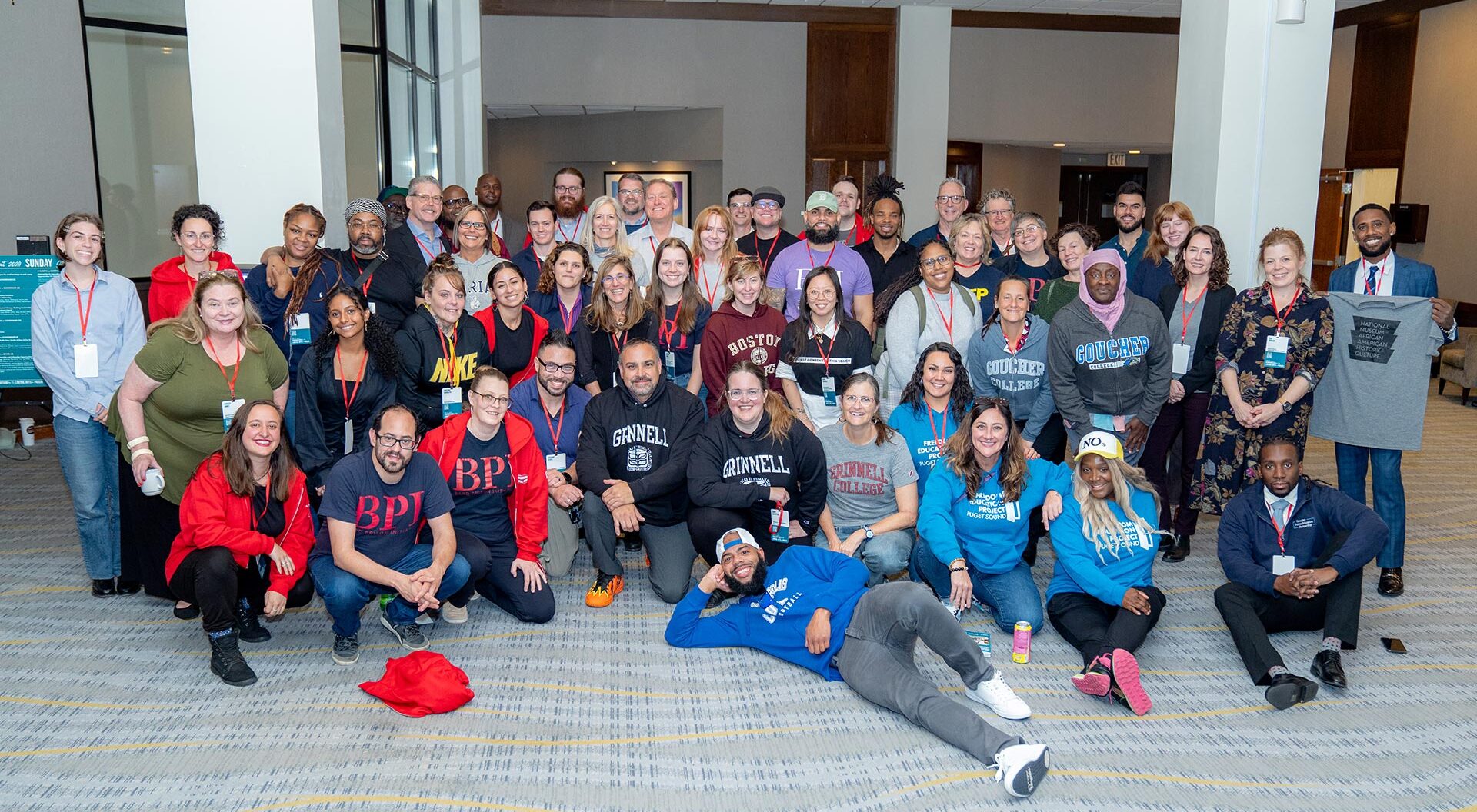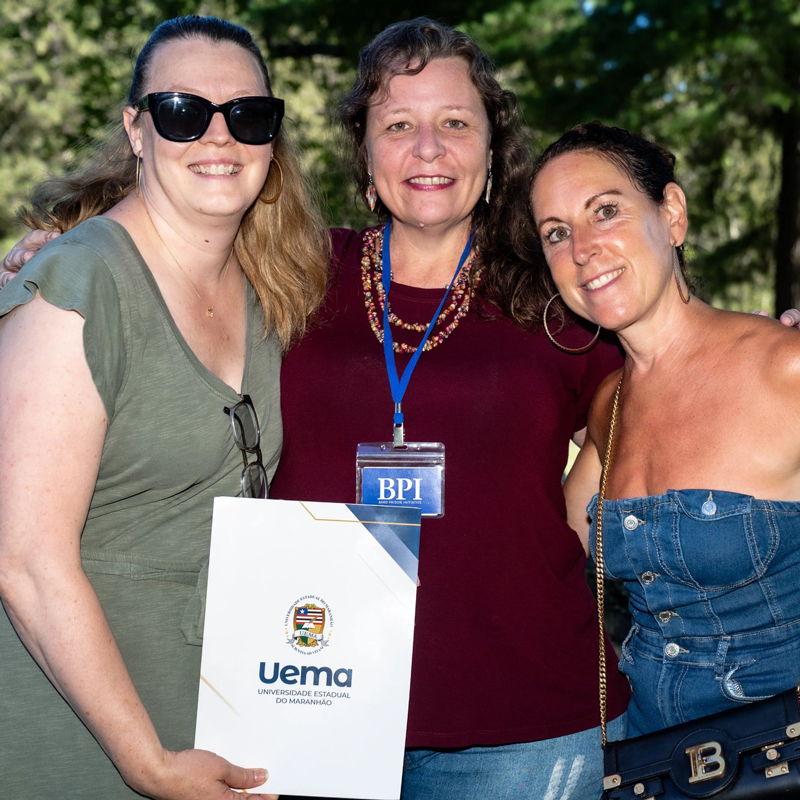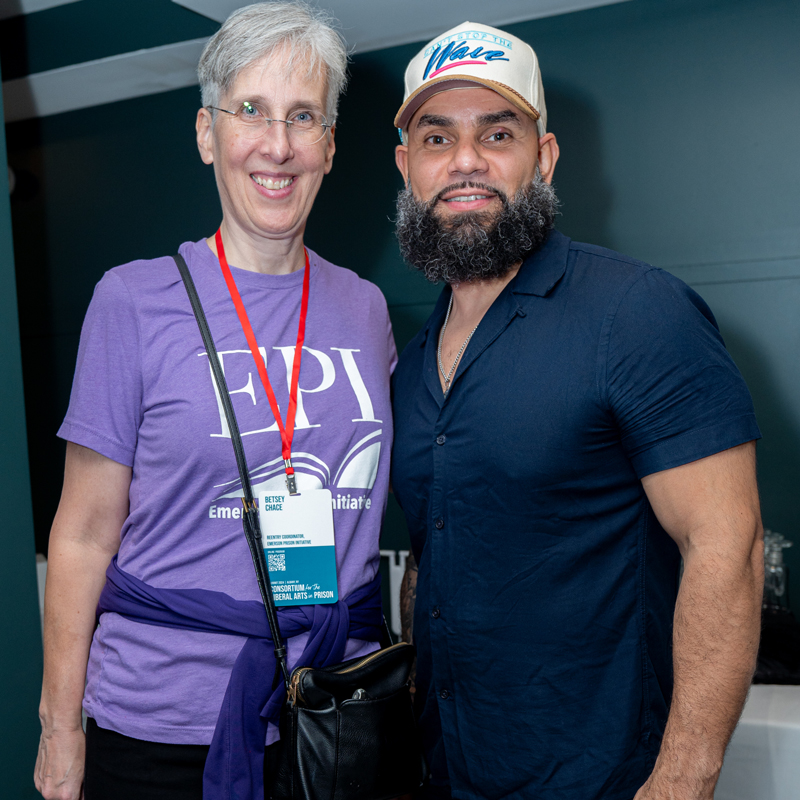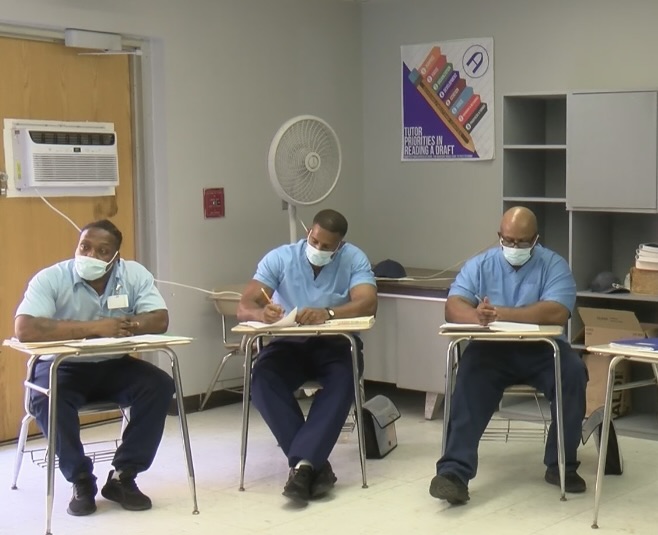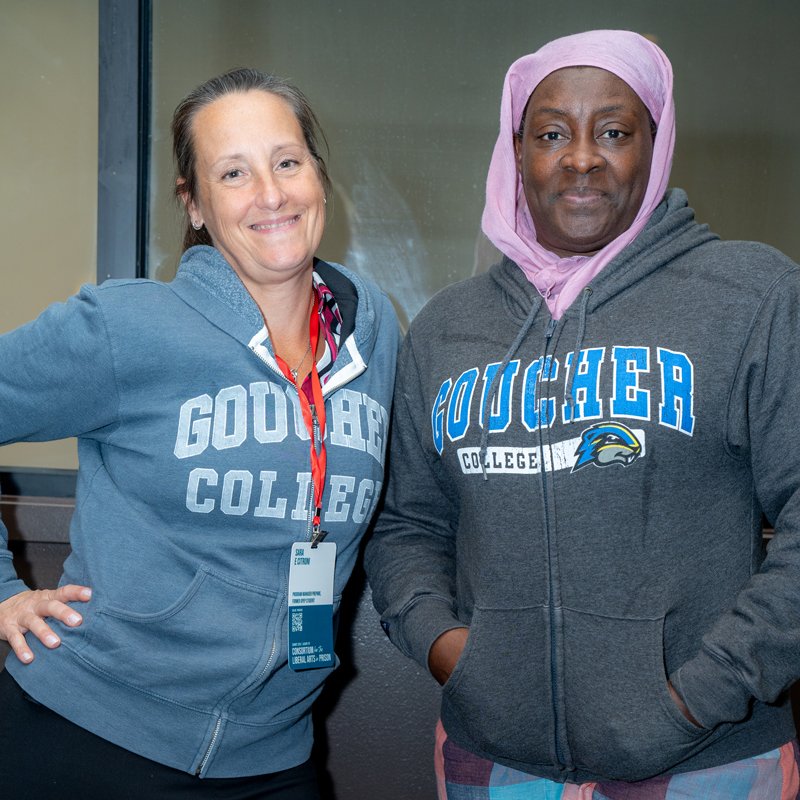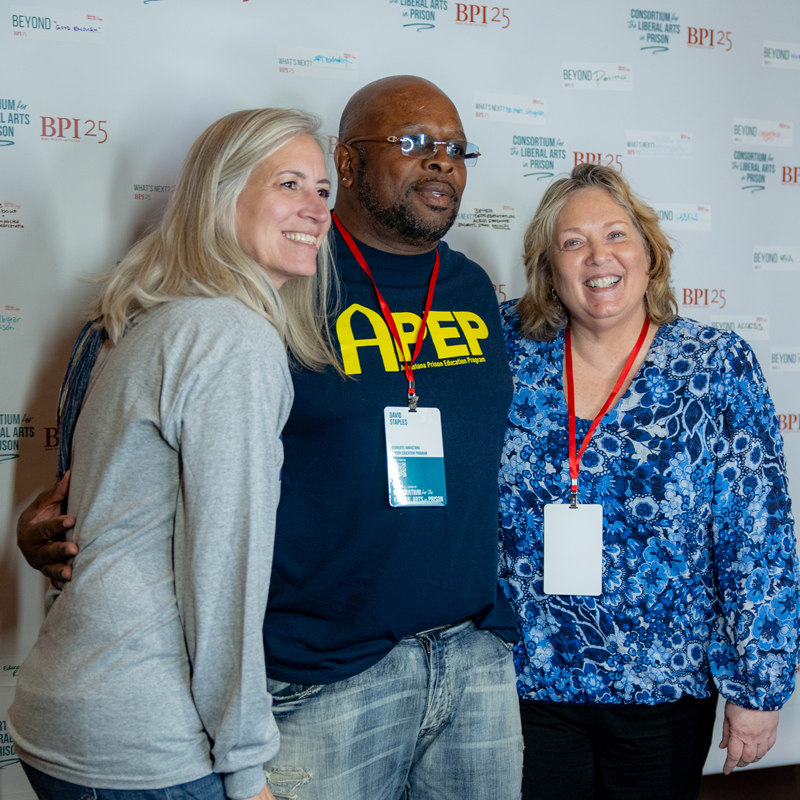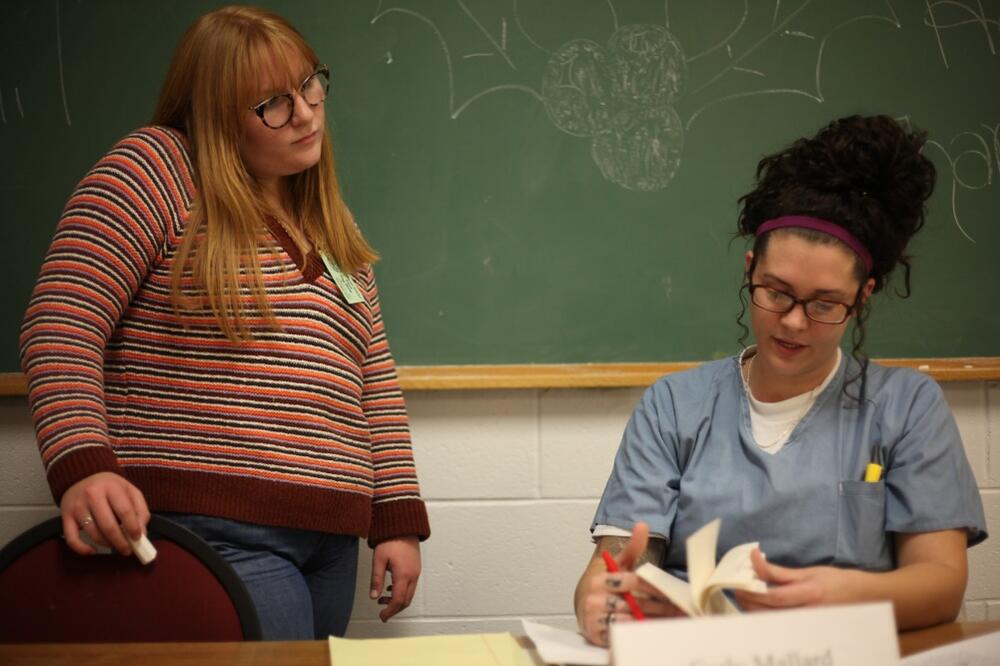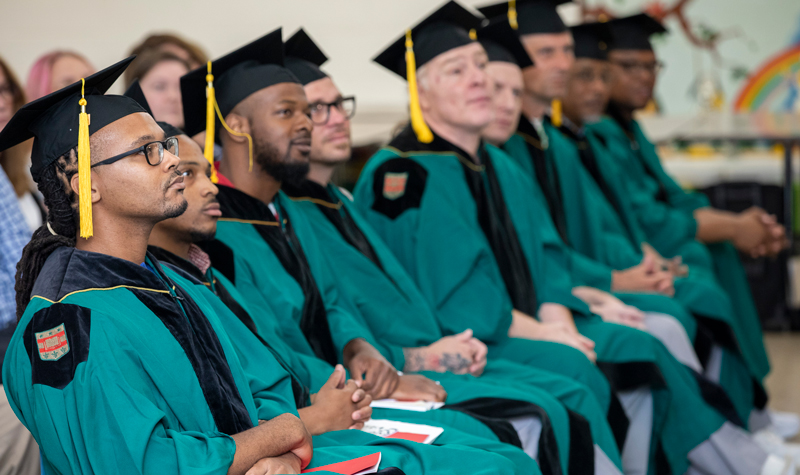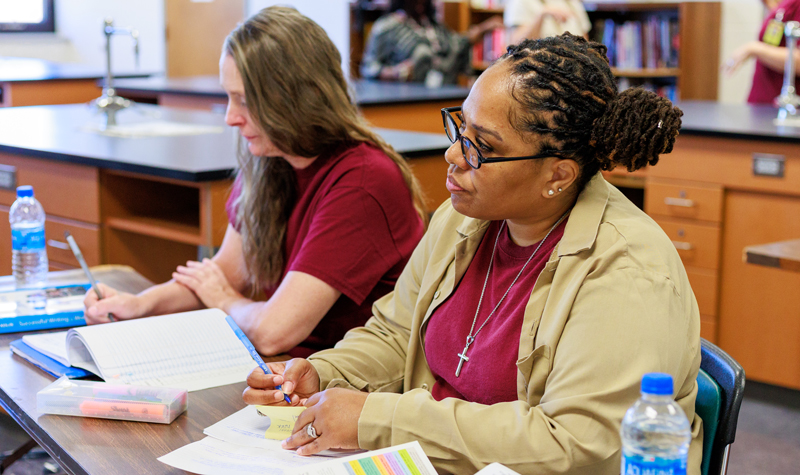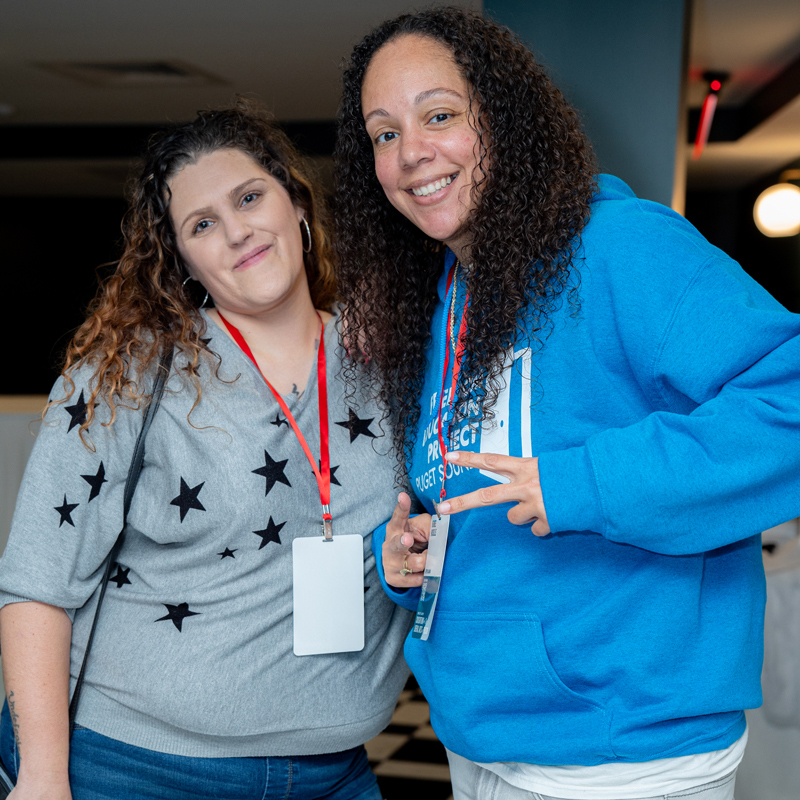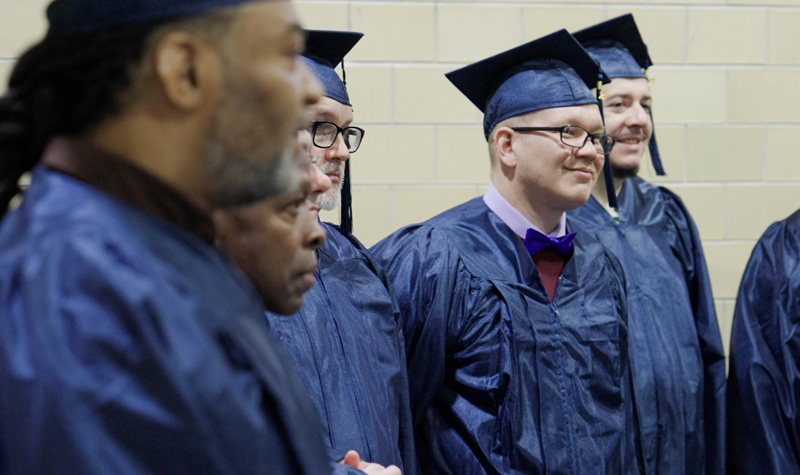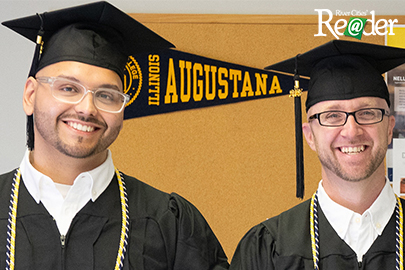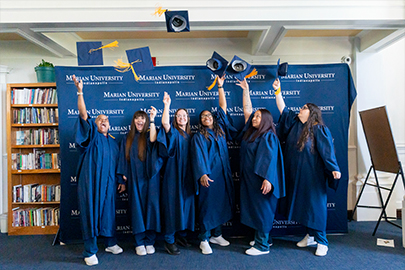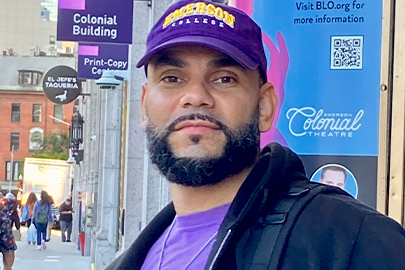For 15 years, through the Consortium for the Liberal Arts in Prison, BPI collaborated with other colleges and universities as they launch fully autonomous college-in-prison programs of their own across the country and internationally. Through this unique network, BPI has pursued unlikely partners, new philanthropic supporters, and critical public-sector allies to create programs that last and flourish over time.
The Consortium is a community of practice that offers strategic support, technical assistance, and critical guidance to colleges and universities as they develop and sustain their own ambitious college programs.
Partners
The programs that make up the Consortium for the Liberal Arts in Prison represent 20 colleges and universities, including Bard, and stretch across 13 states. Partners in the Consortium develop high-quality college-in-prison programs that have the same rigor and high standards expected of main campuses. Together, these leading institutions set the bar for excellence and have become the example for the field of what building programs with integrity and serious commitment looks like, all the while supporting students who are redefining the boundaries of success for people in and returning home from prison.
Wesleyan Center for Prison Education (CT)
In 2009, after years of collaboration, BPI provided a multi-year seed grant to help establish the Wesleyan Center for Prison Education (CPE) at Wesleyan University. Since then, CPE has enrolled 189 students in two prisons for men and women incarcerated in the state. In 2016 CPE partnered with Middlesex Community College, now CT State Community College at Middlesex, so that students could earn an associate degree through Second Chance Pell. In 2020 CPE began offering a Wesleyan University Bachelor of Liberal Studies degree. As of 2024, CPE has awarded 51 Middlesex Associate degrees and 15 Wesleyan Bachelor’s degrees, including one Phi Beta Kappa honoree.
CPE currently offers 9 credited courses per semester, as well as summer coursework and non-credited workshops, and an ongoing guest lecture series.
Visit WebsiteGrinnell College Liberal Arts in Prison Program (IA)
In 2010, BPI provided a multi-year seed grant to facilitate the major expansion of the Grinnell Liberal Arts in Prison Program (LAPP). To date, LAPP has enrolled 120 students at Newton Correctional Facility and allows students to earn a 30-credit First Year of College Award and up to 60 Grinnell credits. LAPP supports its college program with robust efforts from conventional undergraduates and boasts statewide influence in the field.
Visit WebsiteGoucher Prison Education Partnership (MD)
In 2011, after being approached by local faculty and advocates, BPI partnered with Goucher College to create the Goucher Prison Education Partnership (GPEP). GPEP offered its first for-credit college courses in 2012 to 15 students at the Maryland Correctional Institution – Jessup (MCIJ) and expanded to the Maryland Correctional Institution for Women (MCIW) the next semester. In 2016, GPEP was part of the inaugural cohort of 67 colleges nationwide invited to participate in the pilot program reinstating Pell Grant funding to students in prison. Today, GPEP offers over 30 courses to an average of 130 students annually at MCIJ and MCIW. Students earn credits toward a Goucher College Bachelor of Arts degree in American Studies, which they can complete either while incarcerated or post-release on Goucher’s main campus in Towson, MD, or at any other accredited college or university in the country. Since 2012, more than 300 students have enrolled in over 200 credit courses through GPEP. Classes are taught by faculty from Goucher and other local colleges and universities. Faculty and staff hold GPEP students to the rigorous academic standards for which Goucher is known. BPI has partnered with GPEP from its inception, most recently providing a significant capacity-building grant that enabled GPEP to revamp its website, launch social media, have professional videos made, and create new printed materials and branded merchandise.
Visit WebsiteMoreau College Initiative (IN)
The Moreau College Initiative (MCI) was launched in 2012 as a partnership between BPI, the University of Notre Dame, and Holy Cross College at Notre Dame. Its campus inside Indiana’s Westville Correctional Facility is halfway between South Bend, IN and Chicago, IL. MCI benefits from a close and long-standing partnership with the Indiana Department of Corrections. Admissions are run both at Westville and other prisons across the state, and once students are admitted they are then transferred to Westville. Over 70 students study full-time in a curriculum that includes theology, literature, political science, business, science and mathematics.
Both Associate and Bachelor of Art degrees are offered through Holy Cross College, while a majority of faculty and extensive in-kind support come from Notre Dame. Funding is a mix of public and private, recidivism is characteristically low, and post-release graduates have gone on to employment and further higher education across Indiana. To date, MCI students have earned 120 AA and 35 BA degrees. MCI and Holy Cross will have celebrated ten commencement ceremonies at Westville as of May 2024.
Visit WebsiteFreedom Education Project of Puget Sound (WA)
Freedom Education Project of Puget Sound (FEPPS) joined the Consortium in 2014 and received several years of seed funding from BPI. FEPPS provides a rigorous college program to incarcerated women, trans-identified, and gender non-conforming people in Washington state, and creates pathways to education opportunities after students are released back to the community. In 2016, FEPPS graduated its first cohort of AA students and, to date, has awarded 72 AA degrees to incarcerated people. In 2020, FEPPS partnered with University of Puget Sound and the Mellon Foundation to pilot the first Bachelor in Liberal Arts degree offering in Washington. The first class of 10 graduated this summer (2024), and a new cohort is slated to begin in fall 2025. In all, FEPPS has taught over 300 college and pre-college classes and is now looking to expand its offerings to leadership and professional development for the growing pool of graduates wishing to stay engaged. While many students have not been able to complete their degree during incarceration, members of the FEPPS student body have completed degrees post-release from the University of Washington, Washington State University, Evergreen State College, and the University of Puget Sound. We are also excited to celebrate the welcoming of a co-founder and program graduate into the Executive Director’s role for the organization.
Visit WebsiteWashington University Prison Education Project (MO)
Faculty at Washington University in St. Louis approached BPI for advice on teaching in prison and together we designed and launched the Washington University Prison Education Project (PEP). PEP joined the Consortium in 2014, received several years of seed funding from BPI, and began teaching for-credit, college-level classes at the Missouri Eastern Correctional Center in Pacific, MO. In 2022, PEP completed its expansion to a second campus, the Women’s Eastern Reception, Diagnostic, and Correctional Center in Vandalia, MO. PEP offers both an Associate in Arts and a Bachelor of Science degree, as well as pre-college programming, extracurricular programming that includes a lecture series and chess club, and dedicated reentry support services for alumni. Students released prior to graduation may complete degrees at University College on Washington University’s main campus, and PEP alumni are also now pursuing graduate degrees at the university.
There are currently 78 degree-seeking students across both facilities, with 28 additional students currently enrolled in pre-college programming. 100% of the 41 alumni that have returned home are employed full-time or continuing education full-time and employed part-time.
Visit WebsitePrison Education Initiative at Bennington College (VT/NY)
In 2014, a panel of educators convened at Bennington College to explore the mutually beneficial relationships between liberal arts colleges and students in and coming out of prison. This convening led to the creation of Bennington’s Prison Education Initiative (PEI) joining the Consortium in 2016. The program is in its ninth year of offering classes at Great Meadow Correctional Facility in Comstock, NY. PEI students earn Bennington College credits that can be applied toward a Bennington associate’s degree or transferred to other academic institutions or college-in-prison programs nationwide, including BPI. In addition to a wide range of credit-bearing courses in the liberal arts, PEI also offers college prep for prospective students. While PEI has designed a curriculum that accommodates those who will be released or who may transfer to another facility as soon as they are able, the program also offers an opportunity for students who are serving life or virtual life sentences to continue their studies indefinitely, developing a life of the mind and experiencing intellectual freedom even while they remain incarcerated. NYSDOCCS announced the closure of Great Meadow in July 2024. PEI will move to nearby Washington Correctional Facility in 2025.
Visit WebsiteYale Prison Education Initiative (CT)
The Yale Prison Education Initiative at Dwight Hall (YPEI) joined the Consortium in 2017 with the aim of building a real, rigorous college-in-prison program at Yale and to extend access to its faculty and credit-bearing coursework to incarcerated students in Connecticut. With a three-year seed grant from BPI, the program successfully gained support at Yale and admitted its first cohort of students in 2018 at MacDougall Correctional Institution, the largest prison in the Northeast. In 2021, YPEI initiated a collaboration with the University of New Haven (UNH) to matriculate incarcerated students in AA and BA degrees in the liberal arts, and in 2022 launched a new program for incarcerated women at the federal women’s prison Danbury, Connecticut. Together, Yale and UNH offer a year-round college program with credits, faculty, and academic resources and advisors drawn from both institutions. The program was selected to participate in the Second Chance Pell Experimental Sites Initiative and awarded its first degrees in June 2023.
Visit WebsiteEmerson Prison Initiative (MA)
Emerson College launched the Emerson Prison Initiative (EPI) and joined the Consortium in 2017. EPI affirms the value of a liberal arts BA pathway regardless of student circumstance. Students admitted to EPI are students of Emerson College and take courses similar to those taught to students on Emerson’s main campus in Boston. Classes focus on arts, communication, and the liberal arts, bear official Emerson credits, and are taught by Emerson faculty as well as guest faculty from other institutions. Through a carefully constructed curriculum, EPI offers an Emerson College Bachelor of Arts in Media, Literature, and Culture, a degree that combines Emerson’s strengths in media studies, literary studies, and the liberal arts. Following an accreditation process with the New England Commission of Higher Education in 2021, EPI celebrated its first graduation in 2021. After six years at the Massachusetts Correctional Institution at Concord (MCI-Concord), a small men’s medium-security prison, EPI relocated to MCI-Norfolk, the largest men’s medium-security prison in the state. In 2022, EPI also began offering courses at Northeastern Correctional Center, a minimum security prison for men, in order to provide academic continuity for students as they move toward release. EPI also created the Reentry and College Outside Program (RECOUP) in 2021, which works to support students in successful transitions to life after prison through individual case management.
Visit WebsiteVillanova University (PA)
Founded in 1972, the Villanova Program at SCI Phoenix is one of the oldest continuously running college-in-prison degree programs in the country. Villanova University currently offers Associate and Bachelor’s degrees in General Liberal Arts at SCI Phoenix and is a Second Chance Pell recipient. More than 270 students have been served over Villanova’s storied history, with 72 students currently enrolled. Since 1972, 80 students have graduated from the Program with one or more degrees. Students are offered 8 credited courses per semester along with a monthly lecture series.
Visit WebsiteBoston College Prison Education Program (MA)
The Boston College Prison Education Program (BCPEP) joined the Consortium in 2019. With the support of BPI and friends of the University, BCPEP runs a college-in-prison program within MCI-Shirley. The first cohort was admitted in summer 2019 and began accruing credits toward Bachelor of Arts degrees in the fall 2019 semester. The program became a Second Chance Pell site in 2020. BCPEP students begin their studies in Core Curriculum courses which, as on campus, establish a common foundation and provide a breadth of knowledge in the humanities, natural sciences, and social sciences. Courses are taught by Boston College faculty and the credits are granted through the University. Boston College strives to provide an education that goes beyond the classroom and the campus for all of its students. To that end, BCPEP reflects the University’s distinctive mission by embodying a commitment to the Jesuit tradition of educating the whole person and preparing students for meaningful lives in service of the common good. To date, BCPEP has admitted four different cohorts, totaling 62 students.
Visit WebsiteWomen’s College Partnership (IN)
Marian University joined the Consortium in 2019 with the creation of the Women’s College Partnership (WCP) at Indiana Women’s Prison (IWP).
Founded in cooperation with BPI and now administered and supported by the University of Notre Dame as part of Notre Dame Programs for Education in Prison (NDPEP), WCP enrolls roughly 45 students at IWP on the west side of Indianapolis. The inaugural cohort matriculated in January 2019 and, as of December 2023, around 20 students have earned AA or BA degrees from Marian. Founded by the Sisters of St. Francis, Marian is a Catholic university dedicated to teaching and learning in the Franciscan and liberal arts tradition. It is located less than seven miles from the prison.
Augustana Prison Education Program (IL)
The Augustana Prison Education Program (APEP) joined the Consortium in 2022. Founded in 2021 by Augustana College, a selective, private liberal arts college in Rock Island, IL, APEP offers a BA degree with Communication Studies and American Studies majors at East Moline Correctional Center (EMCC). With ongoing technical assistance from BPI’s National Engagement team, and as members of the 2021 cohort of the BPI Summer Residency, APEP launched in August 2021 with 10 students and a full academic year of coursework. APEP leadership came back to the BPI Summer Residency in 2023. The program currently serves 31 students and is designed to grow with new cohorts of 16-20 students annually. APEP students complete nearly identical degree requirements as those earned by students on the Augustana campus; 2023-24 courses include Biology, Classics, Communication, Creative Writing, English, Environmental Studies, History, Liberal Arts, Math, Philosophy, Political Science, Psychology, Spanish, and Religion. Students enroll in semesters, four-week intensive January term courses, and summer school sessions to complete the minimum 124 credit hours required of a BA degree. APEP is a Second Chance Pell site and is funded by the Austin E. Knowlton Foundation, local community foundations, and private donors.
Visit WebsiteNotre Dame Programs for Education in Prison (IN)
In 2022, BPI finalized an agreement with the University of Notre Dame to establish a center for the practice of college-in-prison in Indiana. After more than ten years of work, Notre Dame Programs for Education in Prison (NDPEP) centralizes each of the University’s in-prison programs under one roof to catalyze reentry services and expand, promote, and defend the academic ambition of college-in-prison across the state.
For years, the partnership with Notre Dame has been a key component of BPI’s national agenda. This collaboration has restored college-in-prison and government funding in the state, inspired other Catholic universities, and developed programs that are a beacon of academic breadth and quality in this field.
Visit WebsiteCentral Oregon Community College PEP (OR)
Central Oregon Community College (COCC) joined the Consortium in 2024 with the inception of its COCC Prison Education Program at Deer Ridge Correctional Institution (DRCI) in Madras, OR. The COCC DRCI program launched in spring 2024 with its inaugural cohort of students. Students at the accredited COCC DRCI campus complete courses taught in person by COCC faculty, leading students towards an Associate of Arts Oregon Transfer degree. The addition of the DRCI campus to COCC campuses located in Bend, Madras, Redmond, and Prineville enables the college to serve a fuller range of community members throughout its nearly 10,000-square-mile district in Oregon. The COCC mission of empowering students through high-quality, equitable, and accessible education aligns with BPI Consortium principles. The creation of the COCC DRCI prison education program resulted from the training and impact of the BPI Summer Residency Program.
Rhodes College Liberal Arts in Prison Program (TN)
The Rhodes College Liberal Arts in Prison Program joined the Consortium in 2024, after long being a part of BPI’s larger community of practice including participation in the BPI Summer Residency in 2021 and 2024. The program began in 2016 with a weekly Great Books Reading Group at the Women’s Therapeutic Residential Center (WTRC), a state prison in Henning where about half the women incarcerated by the state of Tennessee reside. In 2019 Rhodes began offering a for-credit Certificate of Liberal Arts at WTRC, a four-semester sequence of courses patterned on Rhodes’s Search program, a signature feature of the college’s curriculum since 1945. In May 2024, the program’s fourth student cohort graduated in a ceremony at WTRC.
Since 2019, 75 women incarcerated at WTRC have completed over 700 Rhodes College credit hours. Twenty-seven have graduated with Certificates of Liberal Arts from Rhodes, and many have gone on to pursue associate degrees through Dyersburg State Community College. To date, 36 faculty members from ten departments have taught in the Rhodes Liberal Arts in Prison program, and over 50 students have participated as peer tutors.
Visit WebsiteMorehouse Andrew Young Center Higher Education in Prisons Program (GA)
Morehouse College joined the Consortium in 2024 following the participation of Professor Kipton Jensen at the BPI Summer Residency in 2023. With a landmark Congressional appropriation, the Morehouse Andrew Young Center Higher Education in Prisons Program (AYC-HEP) is now building from offering college-level courses to launching a credit-bearing, and eventually degree-granting, commitment. What began as a ‘prison education initiative’ in 2020 has slowly but steadily become a full-fledged ‘higher education in prisons program’ with more than twenty faculty from Morehouse who have taught classes inside nearby state and federal prisons in Georgia over the past several years. HEP-affiliated faculty and ‘student ambassadors’ are also charged with advocating for expanding higher education in prisons as well as raising awareness on issues of criminal justice and mass incarceration on campus and in the broader community. Morehouse College is committed to extending the benefits of higher education to incarcerated as well as formerly incarcerated men and women in Georgia.
Visit WebsiteEvergreen Prison Education Program (WA)
The Evergreen State College joined the Consortium in December 2024, as founding director and former BPI faculty Eirik Steinhoff (Bard alum ’95) and member of BPI Summer Residency cohort 2023, launched the Evergreen Prison Education Program (EPEP) into a degree-granting program at Stafford Creek Corrections Center. In May, 2025, The US Department of Education awarded EPEP with Pell Eligibility status, making Evergreen one of first of only a handful of colleges around the country to gain federal approval as a Pell eligible “prison education program” (PEP). The Evergreen Prison Education Program (EPEP) “clears away obstacles to learning” by making Evergreen’s interdisciplinary BA degree available to incarcerated scholars. EPEP’s theme-based, inquiry-driven cohort model of experiential learning is anchored in a rigorous and responsive curriculum focused on critical thinking, scholarly agency, and the co-creation of knowledge. EPEP is part of the The Evergreen Liberation Education Network (ELEN) based at The Evergreen State College. ELEN’s mission is to expand access to an Evergreen education and to provide holistic support services for currently incarcerated and legally liberated people. The network is comprised of organizations and people with decades of experience supporting education and reentry/reintegration services, including Gateways for Incarcerated Youth, established in 1996, Sustainability in Prisons Project, established in 2003, and the recently established Liberation Scholars Student Success, a team of legally liberated professionals that provides direct support services (including academic advising and housing) for system-impacted students to promote sustainable reentry to the Evergreen campus in Olympia and the greater community through education.
Visit WebsiteUniversidade Estadual do Maranhão (Maranhão, Brazil)
Universidade Estadual do Maranhão joined the Consortium in 2025, becoming the first international partner. In 2019, the University launched a pilot educational program for people incarcerated in the city of São Luís, Maranhão, but the COVID-19 pandemic halted any activity and support. With a sub-grant from BPI, funded by the Open Society University Network, the State University of Maranhão was able to formalize the pilot program, officially creating the degree-granting first higher education program in Brazil, which operates in the Female Prison Unit for Resocialization of São Luís.
Visit Website